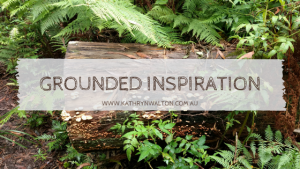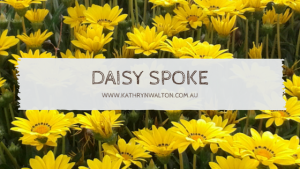
Maximising financial confidence is not something many of us think about, yet it’s such an important topic. Financial confidence impacts the choices you make every day. Your core beliefs about money, spending, finances, savings and debt are all tied up in your financial confidence. The most recent Women Empowered retreat “Framing My Future” reflected on financial confidence and resulted in some amazing insights, affirmations and commitments by the women who gathered together.
Financial confidence and stress is often a silent and limiting roadblock that many women experience, and what’s more, many women are not even aware of its presence or its power. By digging down a bit and shining a spotlight on it, you can identify if financial confidence is a roadblock for you too. Then, you can choose what you’d like to do about it. You have the power within you to create a powerful mindset that will guide you past all sorts of roadblocks and light up the pathway to your future.
Here are five key ways to maximise your financial confidence!
1. Identify a financial goal
 Do you have financial goals (or other goals), perhaps some goals for yourself, and others you share with another person?
Do you have financial goals (or other goals), perhaps some goals for yourself, and others you share with another person?
How do you actively contribute to your goals?
What actions do you take or habits do you have that move you closer to your goals?
What actions do you take or habits do you have that keep you distanced from your goals?
2. Use your voice to communicate about finances
Do you use your voice in relation to money?
What words or phrases do you use in relation to money?
Where do you use these words and phrases? With whom?
Where or how did you learn these words and phrases?
How do these words and phrases contribute to your confidence (or lack of it) with money?
How do you value your own worth and how do you communicate this?
3. Identify your family financial patterns
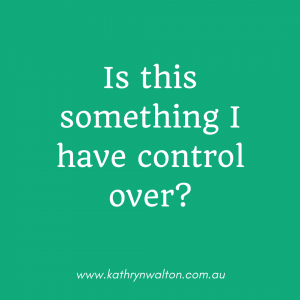 How did your family of origin handle money issues?
How did your family of origin handle money issues?
Were financial issues spoken about openly?
What roles did your parents and others have in relation to money when you were growing up?
What feelings come up for you when you think about money and spending?
What skills, attitudes and patterns did you learn from your family?
Are there any patterns you would like to break free from?
4. Understand how your brain and budgeting work together
Do you budget? Do you know how to budget? Do you want to know how to budget?
Do you know where your money goes? Where are the leaks in your budget?
Do you check statements for fraud or unexplained expenses?
Is there a pattern to your spending, eg pre-menstrual or other patterns? And how do you feel when you are in the process of spending?
Spending money can stimulate dopamine, a bioi-chemical produced in our brains that make us feel good. It can keep us spending even if we haven’t budgeted for it.
What other activities give you a hit of dopamine while you stay in control and without sabotaging your budget or goals? Eg crossing tasks off a to-do list, doing something that gives you a sense of achievement, trying something new.
5. What is your earning potential?
How do you feel about your job or role?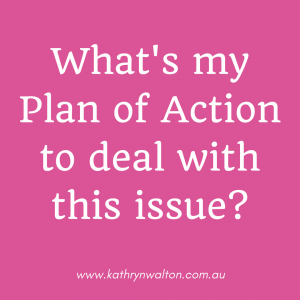
How do you feel about how much you are earning?
How much would you like to be earning?
What limits your earnings?
Which of your inner beliefs limits what you think you are capable of, or capable of earning?
Can you identify a new goal for yourself that challenges these limits?
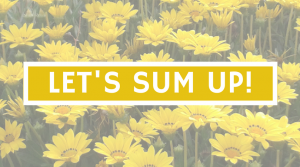
Financial confidence is not set in stone. It’s something we can work on in the same way we can extend our knowledge and the other skills we have. Financial confidence is just one of the many contributors to our overall confidence that is shaped by our inner beliefs and perpetuated by our habits and actions. Do your mental health and sense of wellness a favour by gently challenging your financial confidence – let me know how you go!
 Donna Neale-Arnold was my co-facilitator and special advisor at our recent retreat. She shared her warm, caring and holistic approach to financial management through a series of reflections interwoven with journalling and creative activities. Donna’s rich experience has developed through working in the banking sector as well as in community services as a financial counsellor and in the health sector with her homeopathy and holistic counselling practice DNA Insight at Red Rose Healing Centre in Warwick QLD.
Donna Neale-Arnold was my co-facilitator and special advisor at our recent retreat. She shared her warm, caring and holistic approach to financial management through a series of reflections interwoven with journalling and creative activities. Donna’s rich experience has developed through working in the banking sector as well as in community services as a financial counsellor and in the health sector with her homeopathy and holistic counselling practice DNA Insight at Red Rose Healing Centre in Warwick QLD.
Discovering mountain biking as life’s ultimate parallel universe in her middle age,  Kathryn Walton shares information and reflections in Daisy Spoke that connect, inspire and self-empower women to make healthy choices for themselves. She integrates her love of physical exercise, family, nature, gardening and creative arts with her professional background in mental health social work to facilitate change with individuals, groups and communities of women who are committed to living life to the full.
Kathryn Walton shares information and reflections in Daisy Spoke that connect, inspire and self-empower women to make healthy choices for themselves. She integrates her love of physical exercise, family, nature, gardening and creative arts with her professional background in mental health social work to facilitate change with individuals, groups and communities of women who are committed to living life to the full.

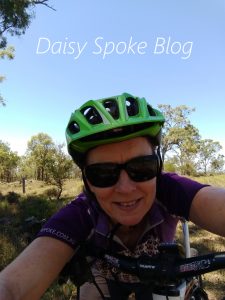 Daily exercise and general physical activity are crucial elements of feeling good. Just as some people might need to diligently take medication every day, I need to exercise every day. Exercise is nature’s way of stimulating the hormones which aid concentration, problem-solving, sleep, digestion, and mood. This daily dose of exercise rebalances our body’s systems resulting in wide-ranging benefits that no single medication can provide. The research is absolutely clear that regular medium to high intensity exercise can have a profound effect on health AND happiness.
Daily exercise and general physical activity are crucial elements of feeling good. Just as some people might need to diligently take medication every day, I need to exercise every day. Exercise is nature’s way of stimulating the hormones which aid concentration, problem-solving, sleep, digestion, and mood. This daily dose of exercise rebalances our body’s systems resulting in wide-ranging benefits that no single medication can provide. The research is absolutely clear that regular medium to high intensity exercise can have a profound effect on health AND happiness.
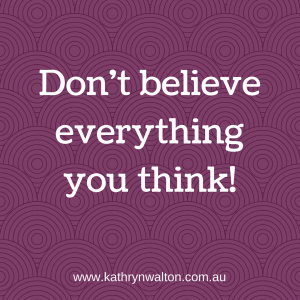 Minds are such complex things! They wield a lot of power over our emotions and our actions (including sleep). But unless you notice what’s going on in your mind, and choose how much power to give it, your thoughts, assumptions and beliefs will control you instead of the other way around. The habit of being hooked by thoughts or strongly attached to them is limiting and anxiety-provoking. The key here is to begin by simply noticing what is happening in your mind, and by doing this with curiosity and without judgement. The power is in the noticing. You’ll collect all sorts of interesting bits of information about how your mind works, what thinking patterns it gets locked into, what beliefs and assumptions are behind it all, and how all of this impacts your physiology, your behaviours and your emotions. One of my favourite sayings is “Don’t believe everything you think!” because we can learn to stand back, notice the thought and choose whether to believe it, or not.
Minds are such complex things! They wield a lot of power over our emotions and our actions (including sleep). But unless you notice what’s going on in your mind, and choose how much power to give it, your thoughts, assumptions and beliefs will control you instead of the other way around. The habit of being hooked by thoughts or strongly attached to them is limiting and anxiety-provoking. The key here is to begin by simply noticing what is happening in your mind, and by doing this with curiosity and without judgement. The power is in the noticing. You’ll collect all sorts of interesting bits of information about how your mind works, what thinking patterns it gets locked into, what beliefs and assumptions are behind it all, and how all of this impacts your physiology, your behaviours and your emotions. One of my favourite sayings is “Don’t believe everything you think!” because we can learn to stand back, notice the thought and choose whether to believe it, or not.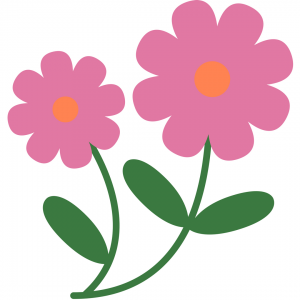 make the best ‘recipe’ for resilience and happiness – our world is full of distractions and quick-fix ideas. So, here I’d like to offer you some of the action-based ingredients that stand out through the ages and in all parts of world, and that are now backed up by rigorous research. In the next blog I’ll outline some of the very powerful mind-based strategies you can add to your mix to really step into your strength.
make the best ‘recipe’ for resilience and happiness – our world is full of distractions and quick-fix ideas. So, here I’d like to offer you some of the action-based ingredients that stand out through the ages and in all parts of world, and that are now backed up by rigorous research. In the next blog I’ll outline some of the very powerful mind-based strategies you can add to your mix to really step into your strength.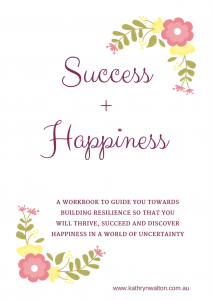 I have an EXCITING OFFER for you!
I have an EXCITING OFFER for you!